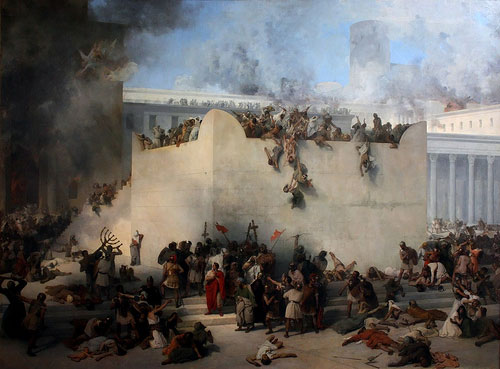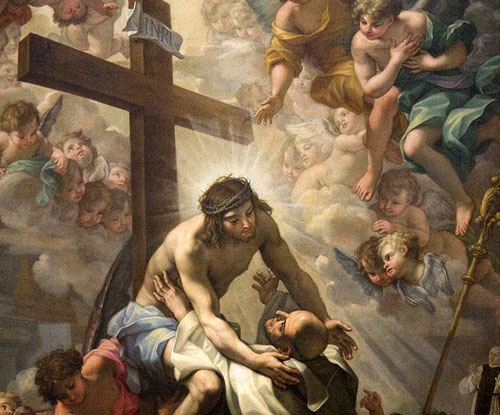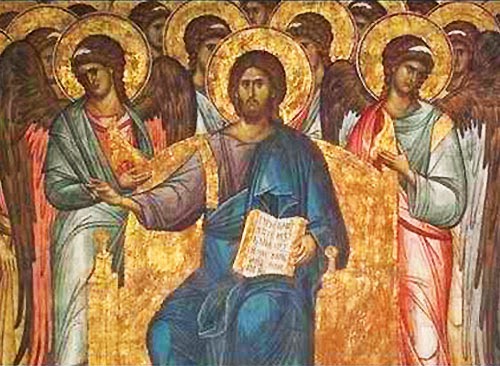It is better for you to enter the kingdom of God with one eye than to have two eyes and be thrown into hell [Gehenna], where “the worms that eat them do not die, and the fire is not quenched.” (Mark 9:47-48)
We have seen that Gehenna is used very differently from Hades, and following the prophetic tradition concerning the Valley of Hinnom in Jeremiah, Jesus’ use of Gehenna was likely in reference to the destruction of Jerusalem that was yet to come in AD 70. Now we will look at a phrase associated with Gehenna, and in the New Testament is found only in Mark 9. But it is also found in the Old Testament, only once, in the final chapter of Isaiah.
Isaiah 66 is about both hope and judgment. First, there is hope for the “humble and contrite of spirit” (v. 2). But then there is judgment on disobedient Israelites who follow their own ways and do what is detestable in the sight of the Lord so that even their sacrifices become an abomination to him (vv. 3-4). There will be a judgment that comes upon them in the city of Jerusalem and even in the temple:
Hear the word of the LORD, you who tremble at his word: “Your own people who hate you, and exclude you because of my name, have said, ‘Let the LORD be glorified, that we may see your joy!’ Yet they will be put to shame. Hear that uproar from the city, hear that noise from the temple! It is the sound of the LORD repaying his enemies all they deserve.” (vv. 5-6)But that is not the end. There is yet comfort, for God brings forth a nation in a day, and there is a Jerusalem that once again becomes the mother of many children. The faithful remnant of Israel is joined by the “wealth of nations” streaming in to honor God (vv. 7-14). Then follows a restatement of judgment on those who do what is detestable in God’s eyes (vv. 15-17). There is a gathering of people from all nations and languages to see the glory of Lord, and a regathering of Israelites from among the nations to come and worship at the mountain of the Lord (vv. 18-23). Finally, in the last verse of the book (as well as of the chapter), there is this note of judgment and shame:
And they will go out and look on the dead bodies of those who rebelled against me; the worms that eat them will not die, the fire that burns them will not be quenched, and they will be loathsome to all mankind. (Isaiah 66:24)This scene depicts God’s judgment on the faithless Israelites mentioned earlier. It is shown as one that occurs on earth and in history, not in some otherworldly realm or somewhere off in eternity. It is not a picture of conscious torment but of lifeless bodies, which as such have no consciousness at all. These are the corpses of those who rebelled against God.
The “worms” do not die and the “fire” is not quenched, we are told, but this does not mean the corpses will never finally be consumed. Quite the opposite, it shows that nothing will keep the worms and the fire from completing their natural work of eliminating those bodies. But the real point of this verse, however, is not about what happens to those bodies but about the great contempt with which the unfaithfulness of these Israelites is held in the eyes of the faithful.
With this background in mind, then, let’s look at how Jesus uses this quote. It comes at the end of three similar statements:
If your hand causes you to stumble, cut it off. It is better for you to enter life maimed than with two hands to go into hell [Gehenna], where the fire never goes out. (Mark 9:43)These are parallel to Jesus’ statements in Matthew 5:29-30. The word for “hell” in each case is Gehenna, not Hades. Like Matthew, the book of Mark leads up to the Olivet Discourse (Matthew 24, Mark 13), in which Jesus describes the destruction that was to come upon Jerusalem and the temple in AD 70, which was a destruction upon the faithless Jewish leaders who rejected Messiah.
And if your foot causes you to stumble, cut it off. It is better for you to enter life crippled than to have two feet and be thrown into hell [Gehenna]. (Mark 9:45)
And if your eye causes you to stumble, pluck it out. It is better for you to enter the kingdom of God with one eye than to have two eyes and be thrown into hell [Gehenna], where “the worms that eat them do not die, and the fire is not quenched.” (Mark 9:47-48)
If we follow the biblical prophetic tradition rather than unsettled rabbinic tradition concerning the meaning of Gehenna, it points us toward that terrible destruction rather than some otherworldly scenario. The final comment about the “worms” and the “fire” in Mark 9 would also then line up with how it was used in Isaiah 66 — a reference to the dead bodies of unfaithful Jews who were destroyed in Jerusalem. Cyril of Alexandria (AD 376-444), a Church Father and bishop, recognized this same connection in his commentary on Isaiah 66.
These misfortunes piled on the Jews are meant to be the things we say happened to them at the hands of the Romans, when the temple was destroyed and all were subjected to cruel slaughter. For suffering such things they became a spectacle for all, but their suffering was not prolonged indefinitely. Yet this is what perhaps is meant when it says, “Their worm will not die nor the fire go out.” Some, however, want to refer these words concerning them to the time of the end of the age. In any case, Christ will deliver us from all such things, through whom and with whom may glory be to God the Father and the Holy Spirit forever. (Commentary on Isaiah 5.6.66.22-24., quoted in Ancient Christian Commentary on Scripture, Thomas C. Oden, General Editor)If we follow the biblical prophetic tradition rather than non-biblical rabbinic tradition, then the language about “worms” that do not die and “fire” that is not quenched does not refer to some post-mortem realm of souls in interminable conscious torment but, rather, to dead bodies (therefore without consciousness) being completely consumed in this present world. In that case, there is no biblical reason to associate it with Hades or notions of hell current in popular religious imagination.

















